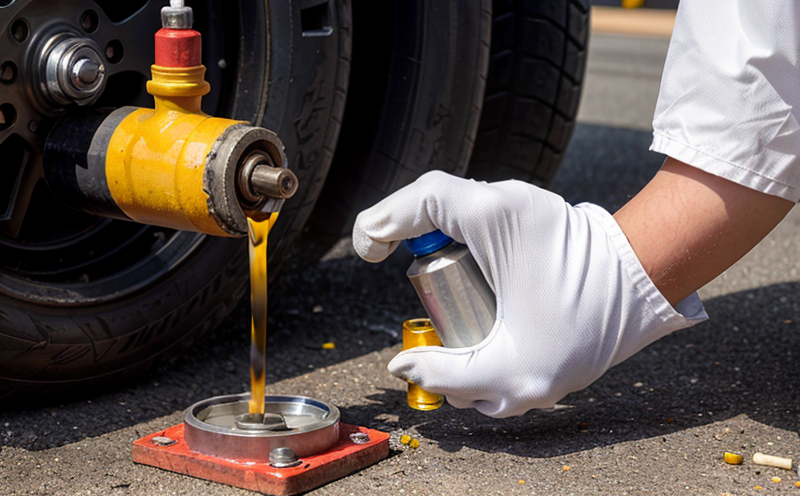ASTM D2783 Four-Ball Extreme Pressure Testing of Oils
The ASTM D2783 Four-Ball Extreme Pressure (EP) Test is a critical procedure used to evaluate the extreme pressure properties of lubricating oils and greases. This test is particularly important for ensuring that these fluids can withstand high-pressure conditions without failing, which is essential in marine environments where equipment operates under severe stress.
The test involves placing a steel ball between two stationary steel balls. A specified load is applied to the central ball, which is then moved up and down at a defined speed. The specimen oil or grease is used as a lubricant during these movements. The performance of the oil is assessed by measuring how much the central ball deforms under the extreme pressure conditions.
The test is conducted according to ASTM D2783, which specifies the procedure for determining the extreme pressure properties of oils and greases using this four-ball method. This standard ensures that all tests are performed consistently across different laboratories, providing reliable results that can be trusted by manufacturers and end-users alike.
Understanding the parameters involved in this test is crucial for quality managers, compliance officers, R&D engineers, and procurement specialists who need to ensure their products meet stringent industry standards. By performing ASTM D2783 tests, companies can demonstrate their commitment to producing high-quality lubricants that are capable of withstanding extreme pressure conditions.
The results from these tests help in optimizing the formulation of oils for various applications, ensuring they perform optimally under challenging operating conditions. This is especially important in sectors like marine and ship equipment testing, where the reliability of lubricants can mean the difference between smooth operations and catastrophic failures.
Industry Applications
| Industry Sector | Application Area | Description |
|---|---|---|
| Marine & Shipbuilding | Lubrication of Marine Engines and Gearboxes | The ASTM D2783 test is vital for ensuring that lubricants used in marine engines and gearboxes can withstand the extreme pressure conditions encountered at sea. This helps prevent equipment failures due to inadequate lubrication. |
| Offshore Oil & Gas | Lubrication of Rigs and Drilling Equipment | In offshore operations, the need for reliable lubricants is paramount. The ASTM D2783 test ensures that these fluids can perform under high-pressure conditions, which is essential for maintaining rig integrity and efficiency. |
| Heavy Construction Machinery | Lubrication of Excavators and Cranes | The extreme pressure properties of lubricants used in heavy construction machinery are crucial for ensuring that these machines operate efficiently under harsh conditions. ASTM D2783 testing helps verify the suitability of the chosen lubricant. |
| Automotive & Transportation | Lubrication of Vehicle Engines and Transmission Systems | The ASTM D2783 test is used to ensure that automotive oils can perform under extreme pressure conditions, which is essential for maintaining engine health and transmission efficiency. This helps in extending the lifespan of vehicles. |
| Industrial Machinery Manufacturing | Lubrication of Heavy Duty Machines | The ASTM D2783 test ensures that lubricants used in heavy-duty industrial machinery can withstand high-pressure conditions, which is critical for maintaining machine performance and reducing maintenance costs. |
Why Choose This Test?
The ASTM D2783 Four-Ball Extreme Pressure Testing of Oils is a robust method that provides accurate and reliable results, which are essential for ensuring the quality of lubricants used in critical applications. By choosing this test, manufacturers can:
- Ensure compliance with international standards.
- Verify the extreme pressure properties of their lubricants.
- Optimize product formulations to meet specific performance requirements.
- Demonstrate the reliability and quality of their products to customers and regulatory bodies.
The test is particularly useful for industries where equipment operates under severe stress, such as marine environments. In these sectors, the ability of lubricants to withstand high-pressure conditions can mean the difference between successful operations and catastrophic failures.
By performing ASTM D2783 tests, companies can gain a competitive edge by ensuring that their products meet or exceed industry standards. This not only enhances customer satisfaction but also helps in maintaining a strong reputation in the market.
Competitive Advantage and Market Impact
The ASTM D2783 Four-Ball Extreme Pressure Testing of Oils provides significant competitive advantages for manufacturers and suppliers of lubricants. By ensuring that their products meet or exceed the stringent requirements set by this standard, companies can:
- Gain a reputation as industry leaders in product quality.
- Differentiate their offerings from competitors who may not adhere to these standards.
- Earn the trust of customers and regulatory bodies.
- Ensure compliance with international regulations, which is essential for global market entry.
The results of ASTM D2783 tests are widely recognized in the industry, making them a valuable tool for marketing and sales efforts. Companies that invest in this testing can expect to see increased demand for their products and enhanced brand loyalty among customers.
Moreover, by demonstrating a commitment to quality through rigorous testing, companies can build long-term relationships with key stakeholders, including end-users and regulatory bodies. This can lead to greater market penetration and increased market share, ultimately contributing to the company's overall success in the competitive landscape.





